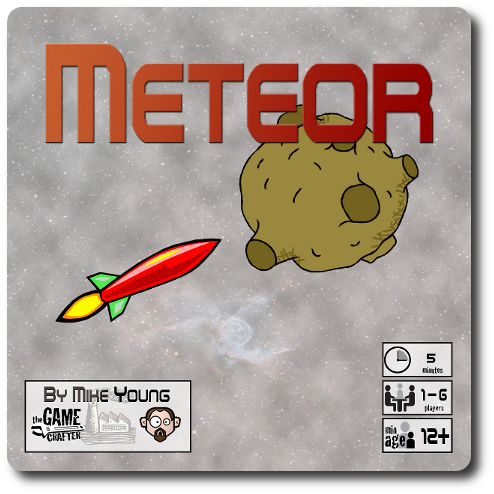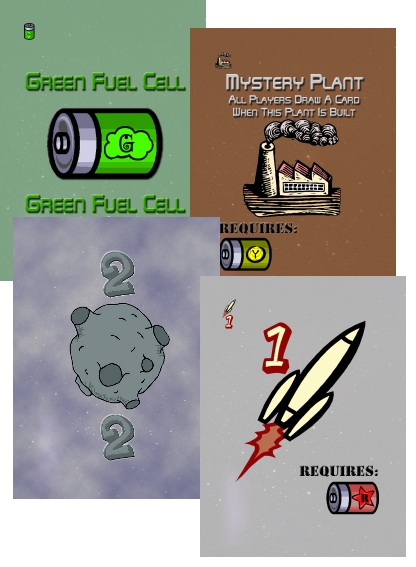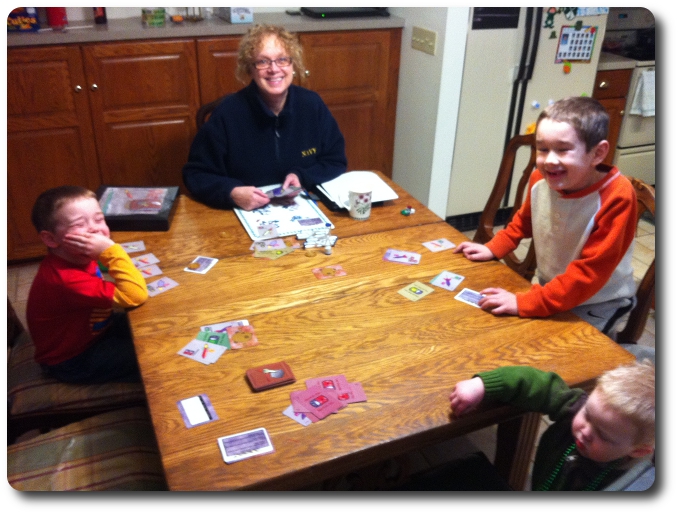
The Basics:
- For ages 12+
- For 1 to 6 players
- Five minutes to complete
Geek Skills:
- Active Listening & Communication
- Counting & Math
- Logical & Critical Decision Making
- Reading
- Emotional Coping Skills
- Pattern/Color Matching
- Strategy & Tactics
- Cooperative & Team Play
- Hand/Resource Management
- Reflex & Speed
Learning Curve:
- Child – Moderate
- Adult – Easy
Theme & Narrative:
- AAAAAAAHHHHHHHH! MEEEETTTTEEEEOOOOORRRSSSSS!
Endorsements:
- Gamer Geek approved!
- Parent Geek approved!
- Child Geek rejected!
Overview
It has finally come to pass. Speeding towards Earth is a storm of meteors that will kill every living thing and change our planet into a lifeless, cratered rock. Humanity will not go gently into that good night, however, and makes one last attempt to save themselves from complete annihilation. You have been selected as one of the individuals to save life as we know it. All of the world’s resources are at your disposal and all of its hopes. There is no time to reflect on the monumental task before you as there are only five minutes before you save the Earth or seal its doom.
Meteor is comprised of 76 game play cards, 5 one-minute sand timers, 5 Build Area cards, 12 Small Meteor cards (grey), 14 Large Meteor cards (brown), and 1 reminder card. All the components are excellent quality and from The Game Crafter.
The Cards
As this is a card game, you best know what you are holding in your hand. Each card has a specific role to play and each role is essential to the player’s victory.
Rockets
- The Rockets (values 1 to 5) will be built by the players and shot into the sky to destroy the meteors. Each Rocket requires a specific number and color of Fuel Cells in order to launch. Only one Rocket can be built at a time (multiple Rockets can be fired at any time once built). For example, a Rocket might list 2 red Fuel Cells. That rocket must have 2 red Fuel Cells attached to it before it can be fired
Fuel Cells
- The Fuel Cells (green, blue, yellow, and red) are what is used to fuel and launch the Rockets. On every Fuel Cell is the letter “R”, “Y”, “G”, or “B”, making it easy for individuals who might be colorblind. A nice touch.
Technology
- The Technology cards allow players to be able to perform specific tasks otherwise not available to them during the Regular and Advanced game. For example, the Comm Satellite allows all the players to talk to each other at the table. Until it is built, none of the players can talk to each other! Technology is built in the same way as Rockets.
Build Areas
- Players build their Rockets and Technology, attaching Fuel Cells as needed, on the Build Areas. Build Areas also act as launching pads for the Rockets. All the players share the Build Areas, but depending on the number of players, not all players can play on them until their owner plays the first card! Additionally, Build Areas are not terribly big, which means that only one Rocket can be built at a time!
Meteors
- There are two types of meteors. These are the Small Meteors (grey with values 1 to 3) and the Large Meteors (brown with values 3 to 7). Included are special meteors that add additional rules and are harder to destroy. Players must launch Rockets that have a combined values equal to or higher than the Meteor’s number value in order to destroy them.

Example of some of the cards included in the game
Everyday, I’m a Building
When building Rockets or Technology, either the item to be built or Fuel Cells can be placed in the Build Area first. However, once cards are played to the Build Area, what you can play on them in the future is limited. All players must build to complete a project. This means if a Rocket or a Technology card is placed first, only Fuel Cells that will complete the build can be played in the Build Area. Likewise, if a Fuel Cell is placed in the Build Area, any Rocket or Technology that cannot use that Fuel Cell can no longer be played on that Build Area. Careful planning is indeed necessary!
Players can also use the Build Area to create a collection. A collection consists of all Fuel Cells or all Rockets. Once the collection has four cards that are all the same color, all the same number, or all different, the collection is completed. Once completed, the collection is cleared off and 5 cards are drawn and as evenly distributed as possible among the players, with any remaining cards going to the player who owned the Build Area or completed the collection.
Blowing Things Up
Once a Rocket is completed it can be launched at a falling meteor. In order to destroy the deathball of rock and ice, the value of the Rocket or the sum of multiple Rockets (as more than one completed Rocket can be fired at once at a single meteor), must be equal to or greater than the Meteor card value. If it is, the Meteor card is removed and is no longer a threat to the Earth.
You can overkill the amount of damage necessary to destroy the meteor, but it’ll cost you. If you should ever destroy a meteor where the value of the Rocket or Rockets is higher than the Meteor card value, you destroy that meteor but the resulting blast makes all the remaining meteors fly all that much faster to the Earth! Yikes!
Of Time and Certain Doom
The players only have five minutes to save the planet. Time is counted with the sand timers. Each sand timer also represents a zone, making the number of zones the meteors fall through five in total. Meteors start at the furthest zone (the first minute) and move closer to the Earth after each minute has passed. At the end of each zone, all the players get to draw more cards, but the game and time does not stop! At the end of the last zone (the end of five minutes), the Earth is hit and destroyed or saved.
Meteors will naturally fall through each zone, taking the full minute to do so unless the players decide to skip to the next zone (start a new sand timer) or a meteor is taken out with an overkill. If a meteor is hit by a combined Rocket value that is higher than the Meteor card value, the zone is automatically done (regardless of the amount of time left on the sand timer) as the blast propels the meteors into the next zone! If this happens on the last zone (the last minute), propelling the a meteor forward, and ending the time available in the zone, the game ends!
Playing the Games
Yes, I said games. Plural. Included in the box is a Basic game, the Regular game, the Advanced game, and the Scenario based game. Additionally, all these games can be played solo, allowing for a very challenging solitaire experience! Depending on which game version you select, your game set up will be different, but the goal is always the same. Survive! The game set up is also dependent on the number of players. Rather than write a very long article on the differences, I suggest you refer to the rules of the game on the game’s official web site. I will, however, summarize each game version here to give you an idea of the depth and complexity of each.
Regardless of which game you select, you only have 5 minutes to save the Earth! The number of cards the players get to start with and the number of meteors is dependent on the number of players or the scenario.
Basic Game
The Basic game should be every players first stop and first game play experience. All the players can talk to each other and all the meteor values are known, allowing players to build the right Rockets to win the game. No Technology cards are used during this game and the special Meteor cards are removed, as well. Rockets and Fuel Cells are the only tools available to the players making the game only slightly easier.
Regular Game
The Regular game is very different from the Basic. First off, no players can talk to each other (gestures and non-language vocalizations are allowed) until a specific Technology card is built (the Comm Satellite), all Technology cards are added to the game play deck, but all the special Meteor cards are still removed. Unlike the Meteor cards in the Basic game, Meteor cards are dealt face-down which shows a number range for the Meteor but not the actual value! This makes it a real possibility to overkill or miss a meteor with a single Rocket! Once a Rocket does target a meteor, its value is shown and remains visible if it did not explode. And if that doesn’t make the game a difficult one, in addition to only having five minutes to save the Planet, if the deck of cards ever runs out, the players lose!
Advanced Game
Recommended only for the most elitist of Gamers or individuals who enjoy a good thumping, the Advanced game is played exactly like the Regular game with the addition of the special Meteor cards. These special Meteor cards introduce new conditions that will sometimes spawn new meteors, require specific Rockets to destroy it, and even change the end game!
Scenario Based Games
For those looking for a unique challenge and are not satisfied with the Advanced game, there are several games based on scenarios that change the rules, starting game condition, and even make the game competitive instead of cooperative. These scenarios add different playing styles, make use of different tactics, and will challenge even the most strategic of players.
Winning the Game
Unless a card says otherwise, victory is only obtained if ALL the meteors are destroyed before the end of the game. If even one single meteor makes it through, it’s GAME OVER for Earth.
I’ve only scratched the surface of Meteor, but I hope I’ve provided enough for you to get a pretty good idea of what the game has to offer and what it includes. To learn more about Meteor, see the game’s official web site where you can also download the complete rules.
Prediction
Honestly, I don’t think this game will be well liked by my little geeks. If you cannot already tell from the overview, it is very intense, requires sharp focus, and the ability to cope with a great deal of stress. Again, you only have five minutes. That’s a terribly short amount of time to play a game and not nearly enough to learn how the play it well after only a few games. Nevertheless, you never know until you try and I was eager to present it to my little geeks. I did so, however, knowing it would be way too demanding for my 4-year-old and most likely just out of reach of my 7-year-old.
I pitched the game to the my little geeks with as much excitement and energy as I could muster, but making certain to explain that the game was going to be very intense. My little geeks were immediately interested and wanted to give it a go. I also got my mom interested in the game and felt pretty good about the energy at the table and the general level of excitement.
All that changed, however, when I demoed the game. It became immediately apparent to my mom that the game was going to be a real kick in the jaw. My 7-year-old also recognized the difficulty and said as much, but was still more than willing to play the game. My 4-year-old just wanted to talk about how meteors killed the dinosaurs and was only vaguely aware that we were playing a game. Such is his passion for the long dead lizard horrors.
After the demo, I picked up the pieces and reset the playing area for the Basic game. As I did so, I asked my little geeks what they thought about the game so far.
“This game looks really hard, Dad. I think the Earth is going to be destroyed.” ~ Liam (age 7)
“A big meteor killed all the dinosaurs, Daddy. They all died when they were hit by it.” ~ Nyhus (age 5)
Good stuff. Clearly already intimidated but interested. Let’s play the game and see how it goes. Will we be victorious or go the way of the dinosaurs?
Overview
Allow me to be blunt. This is not a game for the younger little geeks. Nor is this a game for the dim-witted or individuals who might be suffering from any type of malady that would slow their reflexes. Meteor is a surprisingly demanding game and a stressful one at that. Stressful and chaotic. Players must move fast, think fast, be able to make quick choices, and live with the consequences. If a player vapor locks, expect a devastating defeat.
Also, it is terribly entertaining.
Even though my little geeks had their butts handed to them by the game, we all had a great time at the table. The energy level was off the charts as was the volume. We yelled at each other in frustration, cheered in our victories, and screamed in anguish as the game took us on one very jerky emotional ride. We were pushed to the limits and every small victory felt incredible, only to be quickly reduced to nothing but a pleasant memory as the meteors rained down on us.
And that’s just the Basic game!
When I played the Regular and Advanced game, it quickly became apparent that the Basic game was good for families and non-gamers, the Regular game was good for Gamers, and the Advanced game or Scenario based game was only meant to be played by the most elite of Gamer Geeks. The learning curve does not change, but the level of play difficulty does. In fact, it jumps. No slow or gradual difficultly increase is available. You go from Hot, to Boiling, to “HOLY CATS, THIS IS HELL!” (actual quote from a game player) very quickly as you shift from one game version to the next. To put it another way, the Basic game is like drinking hot coffee and the Advanced or Scenario based games is like drinking hot sauce.
Yeah, there’s a difference.
There is one last point I need to make on this game that I think is very important. This is a cooperative game, wherein all the players must work together. You will either win as a group or lose as a group. Unlike other cooperative games, Forbidden Island for example, Meteor does not suffer from one player dominating the game. One player can’t. Each player has their own Build Area or shares a Build Area. This immediately takes total control away from any player. Additionally, no one knows what the other players have until they play their cards. This means each player gets to choose what they want to play. Of course, there will always be more aggressive and louder players at the table who “think” they know what needs to be done and when, but they really don’t. This is a true cooperative game where everyone must be at their best or certain disaster will hit…. figuratively speaking, of course.

Five minutes later, no one was smiling – but we did play another game!
Gamer Geeks, this is a very challenging cooperative game that will test your communication, critical thinking, and teamwork skills. You only have five minutes to get your collective act together, build your rockets, and save the day. Along the way, you will be plagued by random card draws, players not listening to you, and the unforgiving sand timers. But you must work past this and overcome it. The challenge of the game is not coming from the game itself but the people you are playing with. Winning the game is very possible, but failure to do so is an absolute given if you cannot work with the others as a team. Each player has a part to play, as both leader and follower, and these roles will shift through the game. If you lose, you have only yourself to blame…and the other players, of course.
Parent Geeks, this is a terribly exciting game and a difficult one at that. If you have other parents you like to play games with, this makes for an excellent couples experience and is sure to test the strength of your marriage vows, as “for better or worse” was most certainly added to the ceremony with this game in mind. Expect wonderful highs and terrible lows as you attempt to navigate through the game and work with each other. If you have non-gamer friends, keep them at least 100 feet away from this game at all times. It will break them. For families, this is a wonderful game that will certainly be the start of many stories for many years to come. I should note that this game is listed as “casual”, and that might very well be the case as the game will be demanding enough where you will not have the emotional energy to play it often.
Child Geeks, unless you are 12 or older, this game is not for you. I’m not altogether certain this game is right for 12-years-old either, to be honest. It is a very challenging game and you must be a strong player to help the table. If you are not, you will only feel rushed and stressed. You should most certainly play this game, but Meteor is one of those games you work up to. For example, you don’t jump from Candy Land to Axis and Allies.
Let’s bring this back to what you really want to know. Is this game worth it? With only so much money and time available, you want to buy a game that will be “money well spent”. I’m pleased to say Meteor is well worth it and then some. Unlimited replay value, different and demanding versions of play that support solo, cooperative, or competitive play with scenario based games, Meteor provides a great deal for such a little game. Each one of my victories in the game felt incredible and each defeat was a punch in the gut. You work hard in Meteor. It’s like putting your brain on the treadmill at top speed for five minutes. You will feel the burn and it will tire you out. But with only five minutes of game play and quick game reset time, you can also play a number of games in a row. Odds are, however, you won’t as you will feel emotionally drained after only a few.
I highly recommend you give Meteor a try but do so knowing that this little game is going to test you. Game play is very simple, but accomplishing your goal is not. If you are up to the challenge and know a group of players who feel the same, Meteor is the game for you. As an opener for a game night, it is superb. As a quick challenge, outstanding. For the soft-hearted, not a chance. Meteor will make you cheer or go running to the nearest fallout shelter to curl up in a small ball in the corner, weeping.
And that is a very good thing.
This game was given to Father Geek as a review copy. Father Geek was not paid, bribed, wined, dined, or threatened in vain hopes of influencing this review. Such is the statuesque and legendary integrity of Father Geek.
Discover more from Father Geek
Subscribe to get the latest posts sent to your email.






I went to check the price of this at several online stores but couldn’t find it. Is it officially released yet?
To the best of my knowledge, Meteor is only available from The Game Crafter. I have linked to the store and the specific game in the article above.
Meteor is no longer available at The Game Crafter. It has been picked up by a publisher. Expect a kickstarter campaign later this year.
Awesome!!! Share the details?
Congrats on getting picked up!
Meteor was picked up by Pandasaurus games, a new games publisher. They are going to be doing a kickstarter of their first game around Origins, and Meteor is scheduled to be next. As I understand it, they are already talking to Springboard about the game.
They have also asked for some changes that I’m working on. Can’t talk much more about it, but I think they’ll add variety to the game and make it easier for those who want an easier game and make it harder for those who want a harder game.
You are a horrible tease, sir, but I look forward to learning more about the new game! Again, congrats on being picked up by another publisher!
Pingback: » Jab: Realtime Boxing Game Review
Sounds intense, but you already said that! I can see my game group freaking out and slinging family-unfriendly exclamations at one another already. Might have to take a closer look at this one. Great review!
Pingback: » Zip Zap Game Review
Pingback: Space Sheep! Game Review » Father Geek